“Don’t Look Up” and the Absurdity of Climate Inaction
Air Date: Week of January 28, 2022

“Don’t Look Up” set a Netflix record for most views in a single week and has become the second most-watched original movie in the company’s history. (Photo: Screenshot of “Don’t Look Up” page on Netflix)
Don’t Look Up, Adam McKay’s newest feature film, uses humor and the metaphor of an impending, Earth-obliterating comet to satirize the ideological denial of climate change that pervades much of our current public discourse. Michael Mann, Distinguished Professor of Atmospheric Science at Penn State University, joins Host Steve Curwood to discuss how the film holds up a mirror to the political obstacles to climate action and false promises of future technological fixes.
Transcript
BASCOMB: It’s Living on Earth, I’m Bobby Bascomb.
CURWOOD: And I’m Steve Curwood.
Climate fiction just got a huge boost of star power with the film Don’t Look Up. It’s headlined by Leonardo DiCaprio, Jennifer Lawrence, Tyler Perry, Meryl Streep, Cate Blanchett, and Ariana Grande. It’s about a pair of scientists who discover a massive, “planet-killing” comet hurtling towards Earth with just 6 months until impact. They try to sound the alarm to get a distracted world and self-serving people in power to do something about it. In this scene they are explaining the severity of the situation to a skeptical president of the United States.
Dr. Oglethorpe: Madam President, this comet is what we call a planet-killer.
Dr. Mindy: That is correct.
President: Mmm-hmm. So how certain is this?
Dr. Mindy: There’s 100% certainty of impact.
President: Please, don’t say 100%.
Aide: Can we just call it a potentially significant event?
Jason Orlean: Yeah, yes--
Kate Dibiasky: But it isn’t potentially going to happen. It is going to happen.
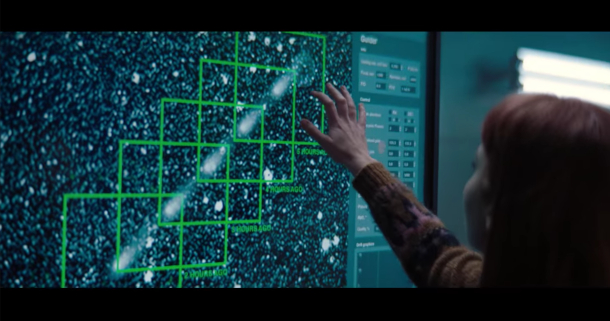
Jennifer Lawrence’s character, PhD student Kate Dibiasky, maps the comet’s trajectory towards Earth. (Photo: Screenshot of “Don’t Look Up” on Netflix)
Dr. Mindy: Exactly. 99.78% to be exact.
Jason Orlean: Oh great. Okay, so it’s not 100%.
Dr. Oglethorpe: Well, scientists never like to say 100%.
President: Call it 70% and let’s just move on.
CURWOOD: Of course, the comet is an allegory for climate change. And no spoilers here, but we do want to talk about the film’s message and what it represents for some frustrated climate scientists. Joining me now is one such scientist. Michael Mann is a Distinguished Professor of Atmospheric Science at Penn State University. Welcome back to Living on Earth, Michael.
MANN: Thank you, Steve. It's always good to be with you.
CURWOOD: So Michael, this is a very dark film in one sense, but it's also intensely funny at times. How was the writer and director Adam McKay able to harness humor to talk about something as terrible as the climate crisis?
MANN: Well, I think that's the challenge. And I'm a big fan of Adam McKay and his films, they're just hilarious. And David Sirota also had a hand in helping write the story. And I think that they really pulled it off, right, which is to both communicate the gravity of the threat, the underlying threat that we're really talking about, because it's a metaphor for the climate crisis even though it's framed as a comet that's about to strike Earth. But to do it in a way that, first of all creates some distance, because there is so much ideological baggage now that people come into the climate discussion with. And so if you talk about climate sort of straight up, you're going to sort of lose some of your audience, you're going to raise their hackles; you know, climate change denial has become ideological among some. And so if you make it about something completely different, but the undertones and the message really are sort of informing their understanding, hopefully, of the climate crisis, then maybe you can get some people to listen, to open up their ears. As I like to say, the front door is bolted shut; you know, climate change denial is a firm sort of part of the ideology of the American right today. So the, the front door is closed, you can't just barge through with facts and figures. So you look for that side door. And I think humor and satire is that side door and that, and that's what they've done here.
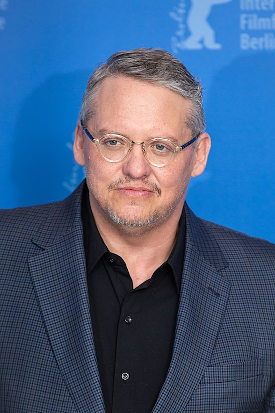
“Don’t Look Up” director and writer Adam McKay at the Berlin International Film Festival in 2019 (Photo: Harald Krichel, Wikimedia Commons)
CURWOOD: Yeah, you know part of the issue is, how do you avoid getting onto that slippery slope of urgency into “doomism”? How did, how did this movie succeed in doing that?
MANN: Yeah, and you've hit on, you know, the key point here, and this is a point that I emphasize in my recent book, The New Climate War, is, you know, the importance of communicating both the urgency, but at the same time, the agency: the fact that it's not too late to do something about the problem. And you know, there is the danger that some people will come away from the film with the wrong message, because it's possible to come away from it, and think, "oh, wow, we're doomed, that's really the message of this film." But that isn't the message, if you sort of think more about how things unfold, and I don't want to sort of spoil the film for your listeners who haven't seen it yet. But suffice it to say that there was a path forward that was safe and reliable. And that's the path that wasn't taken, right. And so without giving it all away, if they had addressed this problem in the way that scientists said it needed to be addressed, then there was a real chance for, for success, but instead, sort of, they listen to the voices of tech billionaires. And that led us down the wrong path. And, and that's, I think that's the critical message. We're at a juncture. There's the right path forward, and there's the wrong path forward. And the movie shows us what happens with the wrong path.
CURWOOD: Indeed, and the techno-billionaire they have there, what is this, a send up of, is it Elon Musk? Am I looking at Bill Gates? Am I looking at Jeff Bezos, is it Mark Zuckerberg -- who am I looking at in this character?
MANN: Yes, yes, all of the above! [LAUGHS] I think it's an amalgamation of all of those individuals. And you can literally see pieces of each of them in the character, the way that social media information that we provide is used for profiling and targeting us, that's in there. But to me, what was really significant was this idea that we can engineer our way out of the crisis. And to me, this was an extended metaphor, or an allegory or whatever you want to talk about, clearly, for the climate crisis. And it was also communicating the dangers of sort of thinking that we can just invoke some techno-fix down the road, as a way of sort of denying the actions that we need to take right now, while we still can.
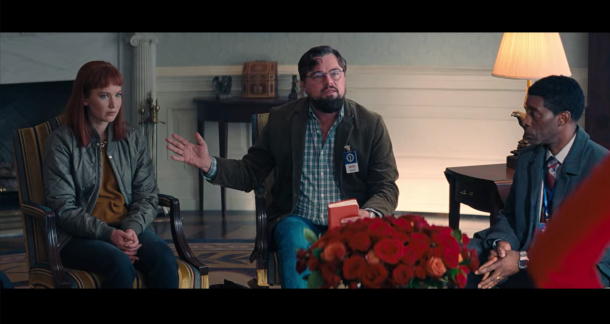
In the Oval Office, Dr. Randall Mindy (Leonardo DiCaprio) tries to explain the comet Kate Dibiasky (Jennifer Lawrence) has discovered is headed straight towards Earth, alongside Dr. Teddy Oglethorpe (Rob Morgan), head of the Planetary Defense Coordination Office. (Photo: Screenshot of “Don’t Look Up” on Netflix)
CURWOOD: I mean, they say that this comet could make trillions of bucks for this guy, and essentially saying that people in these positions of power think it's worth risking the entire planet, to get it out and bring it to market. Kind of like the fossil fuel reserves that are sitting around, that must stay in the ground if this planet is to remain habitable, huh?
MANN: No, absolutely. This idea that we can continue to burn fossil fuels because look, we will just find a techno-fix down the road -- "Trust us!" So, you know, we hear a lot about geoengineering, and there are some scientists, and even Bill Gates is actually financing research into these massive planetary interventions like shooting sulfur dioxide particles into the stratosphere to block out some of the sunlight, to try to cool the planet back down. And the more you look into these potential interventions scientifically, the more you realize there are all sorts of potential unintended consequences. That's one fundamental problem. But even more problematic, I would say, from the standpoint of the politics and the policy, it provides a convenient argument for delay. It's a crutch for polluters who want to say, hey, look, we can solve this problem down the road. So let's continue to burn fossil fuels and generate economic growth, because we'll figure out how to solve this problem later -- "Trust us!" But even some of the other seemingly more moderate geoengineering approaches, like massive carbon capture, where we sort of suck the carbon back out of the atmosphere. Well, we're fighting the laws of thermodynamics and economics in trying to do that, it would be hugely expensive, it's unclear that it can be done at scale. But it's being used by some polluters, again, as this crutch. And we've got to cut our carbon emissions by 50% within this decade to avert catastrophic warming. We're not going to do that with new breakthrough technology, we can solve this problem using existing renewable energy, there are plenty of studies that demonstrate that, the obstacles aren't technological at this point. They're entirely political. It's really that simple.
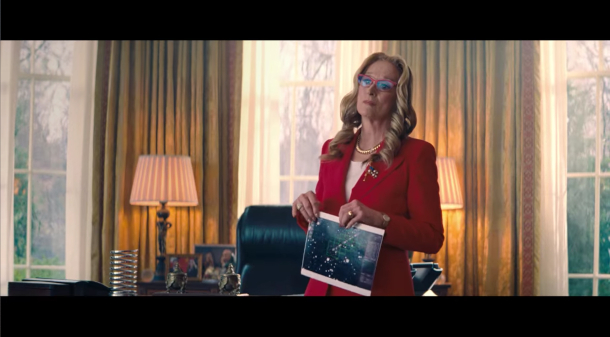
A distracted President Janie Orlean (Meryl Streep) receives the news about the comet headed straight for Earth. (Photo: Screenshot of “Don’t Look Up” on Netflix)
CURWOOD: All right, Michael, so where do you think this allegory breaks down? And in your view, how well does it, does it work to get this message across do you think?
MANN: I think it works in the sense that it's so distant from the climate crisis, that like I said before, it doesn't come with that same ideological baggage. I would like to think we could all band together today, Republicans and Democrats alike, and agree that we need to do something about an imminent planet-killing comet, right? We would hopefully all, you know, band together and the fact that we don't, that even with something as clear-cut as that it devolves into politics and greed. And, and so all metaphors are imperfect by design. And, you know, this metaphor is imperfect in the sense that it's sort of a discrete event. We don't go off a cliff at three degrees Fahrenheit warming of the planet. What we're doing instead is we're walking out onto this minefield. And the farther we walk out onto that minefield, the more danger we encounter. So there's an imperfect translation of, you know, the metaphor to the climate crisis. At the same time, we can say that, you know, three degrees Fahrenheit warming is really bad. A lot of bad things will happen if we exceed that amount of warming, it's something we really want to try to avoid at all costs. So the binary nature of the disaster isn't a perfect parallel with the climate crisis. But the idea that there are thresholds that we need to avoid, and we need to take action now to avoid them, translates reasonably well, I think.
CURWOOD: So Michael, I've got to ask you this. I mean, to what extent do you envy the certainty that the scientists in this movie have about, you know, the discovery here, it's going to hit the planet in exactly six months and 14 days. Very convenient for them.
MANN: [LAUGHS] Yeah, that's right. I mean, it's an exact prediction that can be tested by a single event, right? Whereas climate science is a much more complex sort of science in the sense that it isn't just a single event that we're trying to predict. It is a massive number of unfolding events and amplified events, and sometimes subtle linkages between the warming of the planet and all the various impacts that that is leading to. It's not quite as direct and immediate and acute, as you know, a comet that's about to strike us. And yet, when it comes to the bottom line, there's a remarkable similarity. It's that ideology has been used to divide us and to favor an agenda of inaction, that, in the case of the film, costs us the entire planet. But in the case of climate change, if we fail to rise to the challenge, it will cost us a livable planet.
CURWOOD: Indeed. And you know, the funny thing about the precision though: back in the 1960s, Exxon Mobil and those folks had a pretty good clue. By the '70s and '80s their predictions are playing pretty much right out to where CO2 levels and temperatures are these days.
MANN: You're absolutely right, Steve, it's, it's, it is remarkable that, you know, when we talk about all the different impacts of climate change that gets into subtleties and complexities, but if we just stand back and look at the big picture, the warming of the planet, it's actually exactly as was predicted a half century ago by none other than Exxon Mobil, the world's largest publicly traded fossil fuel company. Their own scientists successfully predicted both the rise in carbon dioxide concentrations, if we remained addicted to fossil fuels, the rise that we would see by now, and the warming that that would cause. And so even as Exxon Mobil's PR apparatus was attacking independent climate scientists and attacking climate science publicly, their own scientists were delivering the same fairly precise message.
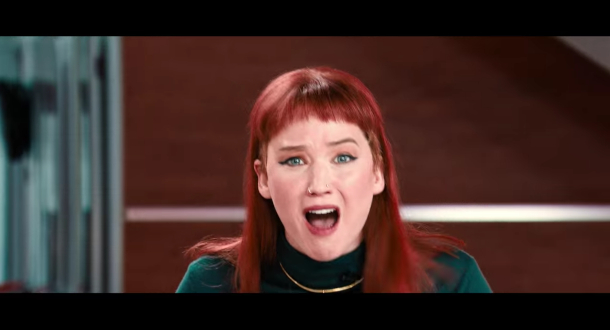
Jennifer Lawrence’s character Kate Dibiasky loses it on live television when the anchors try to downplay the news that a “planet-killing” comet is on a collision course with Earth. (Photo: Screenshot of “Don’t Look Up” on Netflix)
CURWOOD: Hey, by the way, Michael, you have a connection to this film, huh?
MANN: [LAUGHS] Yeah, it's sort of funny. So I would have liked to have attended the premiere, I was invited to attend it. But the logistics of making it to New York City made that, you know, in the era of COVID, made that really difficult. And my, my daughter was, was very disappointed because she was looking forward to attending it with me in New York City. So instead, the Netflix folks were nice enough to send us a link so we could watch the film in advance, in the comfort of our home. And so we're watching this film, and I don't know, maybe it's 30 minutes into it or so as we're meeting, you know, we're getting to know Leo, Leonardo DiCaprio's character, Dr. Mindy, the astronomer, who's, you know, whose graduate student, really, and he have discovered this comet. And Leo's, you know, mannerisms and just the way he speaks -- my daughter said to me, "I think he's basing this on you" --
CURWOOD: [LAUGHS]
MANN: -- And I sort of laughed that off. I mean, I've gotten to know Leonardo DiCaprio pretty well, I've, you know, corresponded with him on a number of occasions, helped advise him on some projects. And, you know, at some level, we've sort of become friends. But I didn't really, it didn't occur to me that that might be the case. I sort of laughed that off until, I guess it was a couple of weeks later, there was an interview with Leo, that aired, and in it he named-checked me when he was talking about sort of what inspired the character in the film. And I didn't know how to take that. Because if you watch the film, and again, I won't give it away -- Leo is a flawed character. You know, in the end, you know, I would put him on the side of hero, but he's a flawed hero. And some of those flaws, I would hope, aren't commentaries on me specifically, especially the marital infidelity! [LAUGHS] My wife sort of looked at me askance as soon as, you know, that connection was made. So, you know, I think what, what Leo was trying to embrace was the frustration that we climate scientists feel in trying to communicate this, this threat to, you know, the public, but facing this massive headwind of misinformation and, and sort of the way that the media often doesn't really treat these issues with the seriousness and the urgency that some might hope. Of course, Living on Earth being the obvious exception to that! [LAUGHS]
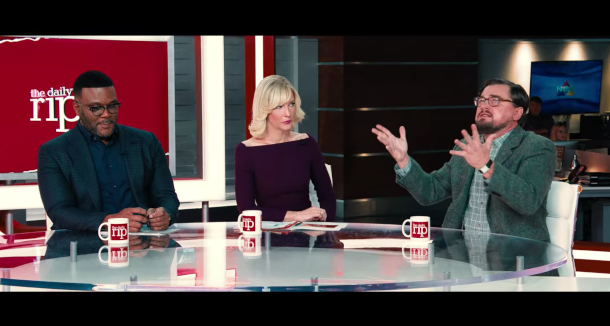
The astronomer Dr. Mindy (Leonardo DiCaprio) has an emotional meltdown on a morning news show hosted by Jack Bremmer (Tyler Perry) and Brie Evantee (Cate Blanchett). (Photo: Screenshot of “Don’t Look Up” on Netflix)
CURWOOD: Yeah, I mean, I had to laugh out loud at some of those TV sequences, because, you know, network TV will frequently, yeah, if they brought on a serious scientist, maybe the next thing is, you know, a dancing chimp or something.
MANN: [LAUGHS] Right!
CURWOOD: They just don't... But, and I do hope that the character, Dr. Randall Mindy, wasn't entirely based on you because, you know, at one point, he gets so frustrated with the lack of urgency that he absolutely loses it and has a meltdown on live television in this film. And, and also, the Jennifer Lawrence character has a similar situation. I guess you've probably never really melted down like that on television, but -- but how close have you come?
MANN: [LAUGHS] Yeah, you know, I think he goes through this sort of rapid media training, they recognize he's going to be doing the media circuit. And so they sort of try to train him. But he goes off script at one point and does have this meltdown. And suffice it to say that I think all of us who are climate scientists, but have also engaged in efforts to communicate the science at one time or another, have experienced some of the same frustrations. But we've resisted, at least heretofore, [LAUGHS] --
CURWOOD: [LAUGHS]
MANN: -- thus far, so far, it hasn't happened to me—an on-air meltdown. But I thought that it was a clever way of just saying, Look, people! We have to confront that this really is a crisis, we can't continue to tiptoe around it and, and treat it as if it's just part of the entertainment ecosystem. This isn't just about entertainment and communication, it's about, you know, addressing the greatest threat that we as a civilization have addressed. And in the movie, it's a comet; in the real world, it's the climate crisis.
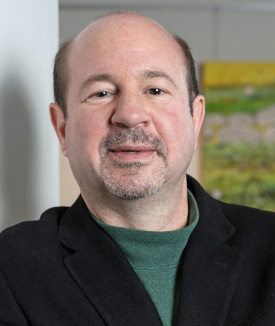
Dr. Michael Mann is a Distinguished Professor of Atmospheric Science at Penn State University and has been an advisor to Leonardo DiCaprio about climate change. (Photo: Joshua Yospin)
CURWOOD: And before you go, Michael, comment on the title of the film.
MANN: Don’t Look Up [LAUGHS]. Well, you know, "don't look up" is what the inactivists, as I call them in The New Climate War, the forces of inaction, polluters and those promoting their agenda, politicians and front groups and conservative media outlets. They don't want us to look up, something that's plainly evident. All we have to do is use our two eyes, and we would see it. Well, that's true with the climate crisis, isn't it? We're watching it play out in real time now, in the form of these unprecedented extreme weather disasters. All we have to do is just look out at what's happening. And so I think that's the commentary. And of course, there's the movement that arises among the denialists in the film -- "don't look up." Don't, you know, don't open your eyes. Pay no attention to these massive, costly weather disasters that are playing out now in real time. That's sort of what the forces of climate inaction are telling us.
CURWOOD: Michael Mann is a Distinguished Professor of Atmospheric Science at Penn State. His latest book is called The New Climate War. Michael, thanks so much for taking the time with us today.
MANN: Thank you, Steve. Always a pleasure.
Links
Watch “Don’t Look Up” on Netflix
Read Michael Mann’s commentary: “Don’t Look Up. But Do See This Film!”
High Country News | “How do you make a movie about a hyperobject?”
Living on Earth wants to hear from you!
Living on Earth
62 Calef Highway, Suite 212
Lee, NH 03861
Telephone: 617-287-4121
E-mail: comments@loe.org
Newsletter [Click here]
Donate to Living on Earth!
Living on Earth is an independent media program and relies entirely on contributions from listeners and institutions supporting public service. Please donate now to preserve an independent environmental voice.
NewsletterLiving on Earth offers a weekly delivery of the show's rundown to your mailbox. Sign up for our newsletter today!
 Sailors For The Sea: Be the change you want to sea.
Sailors For The Sea: Be the change you want to sea.
 The Grantham Foundation for the Protection of the Environment: Committed to protecting and improving the health of the global environment.
The Grantham Foundation for the Protection of the Environment: Committed to protecting and improving the health of the global environment.
 Contribute to Living on Earth and receive, as our gift to you, an archival print of one of Mark Seth Lender's extraordinary wildlife photographs. Follow the link to see Mark's current collection of photographs.
Contribute to Living on Earth and receive, as our gift to you, an archival print of one of Mark Seth Lender's extraordinary wildlife photographs. Follow the link to see Mark's current collection of photographs.
 Buy a signed copy of Mark Seth Lender's book Smeagull the Seagull & support Living on Earth
Buy a signed copy of Mark Seth Lender's book Smeagull the Seagull & support Living on Earth

